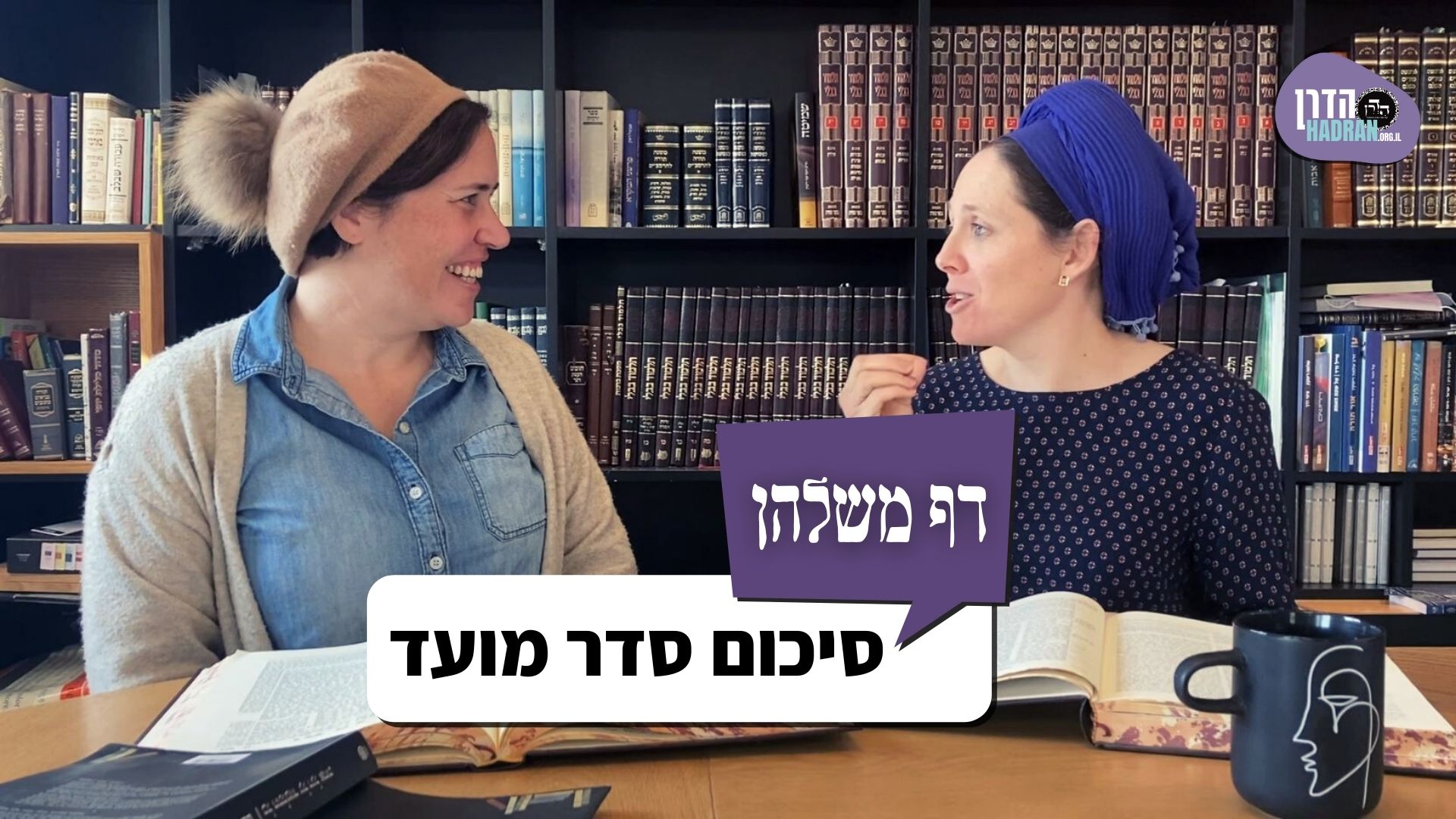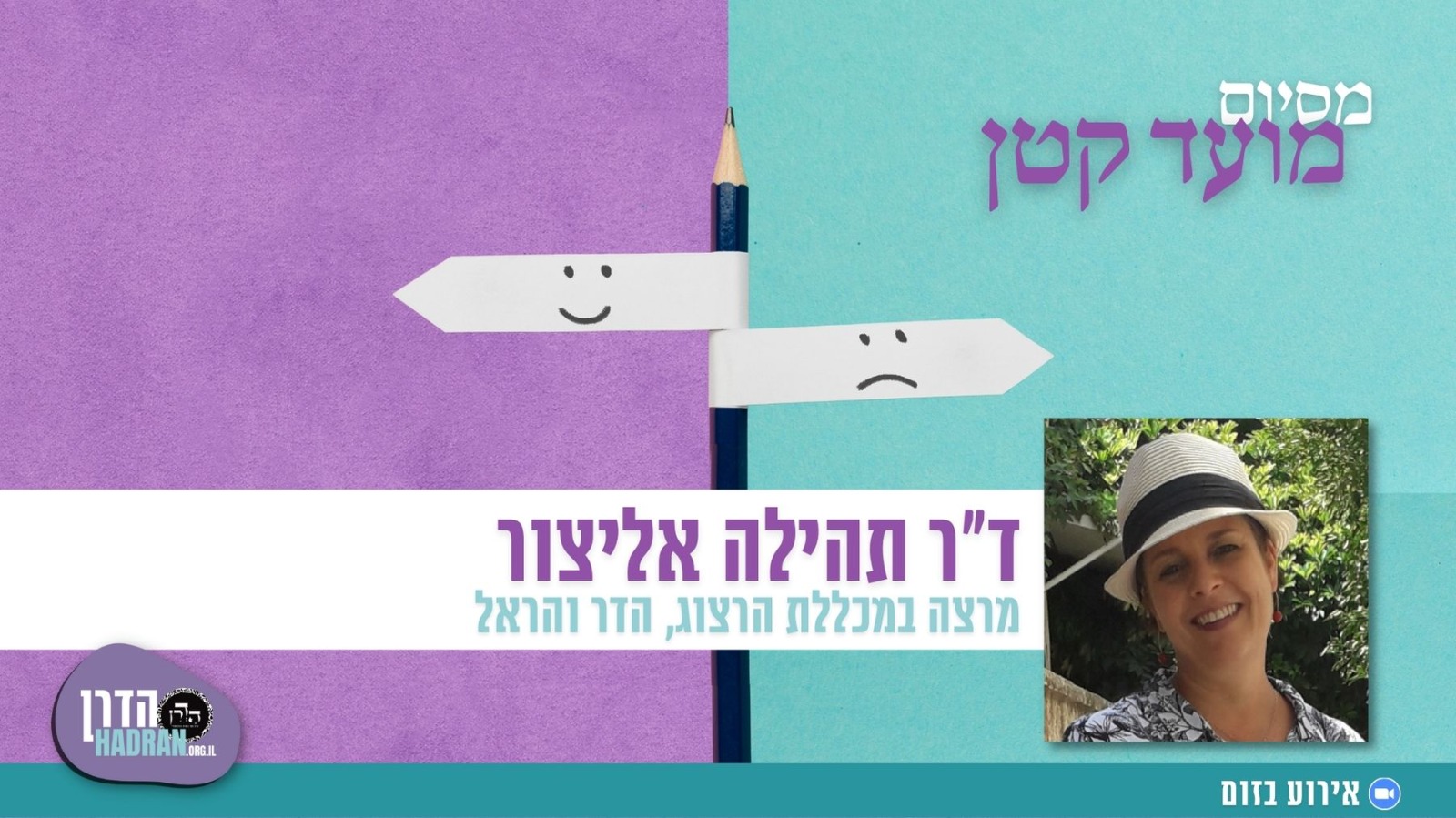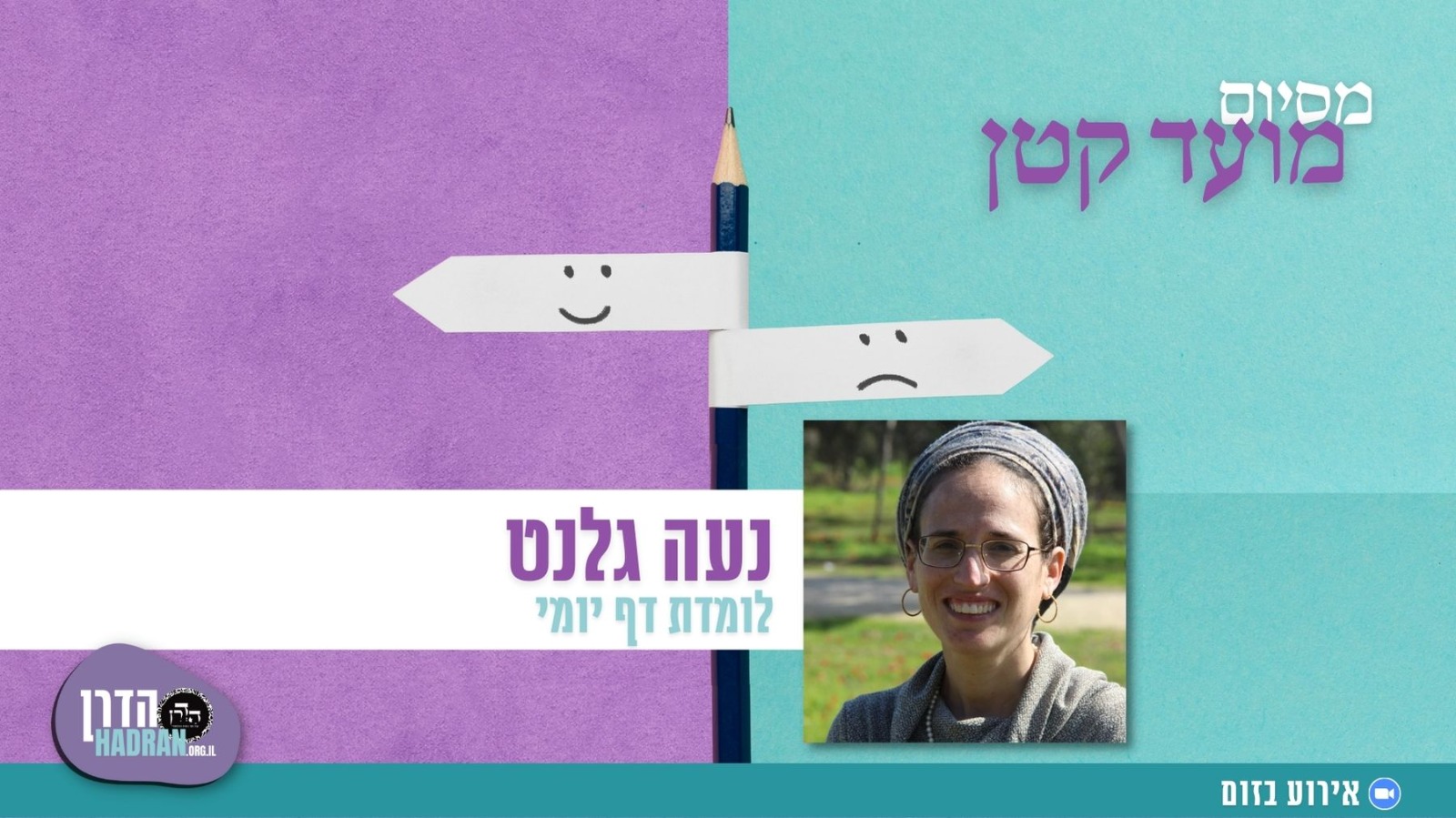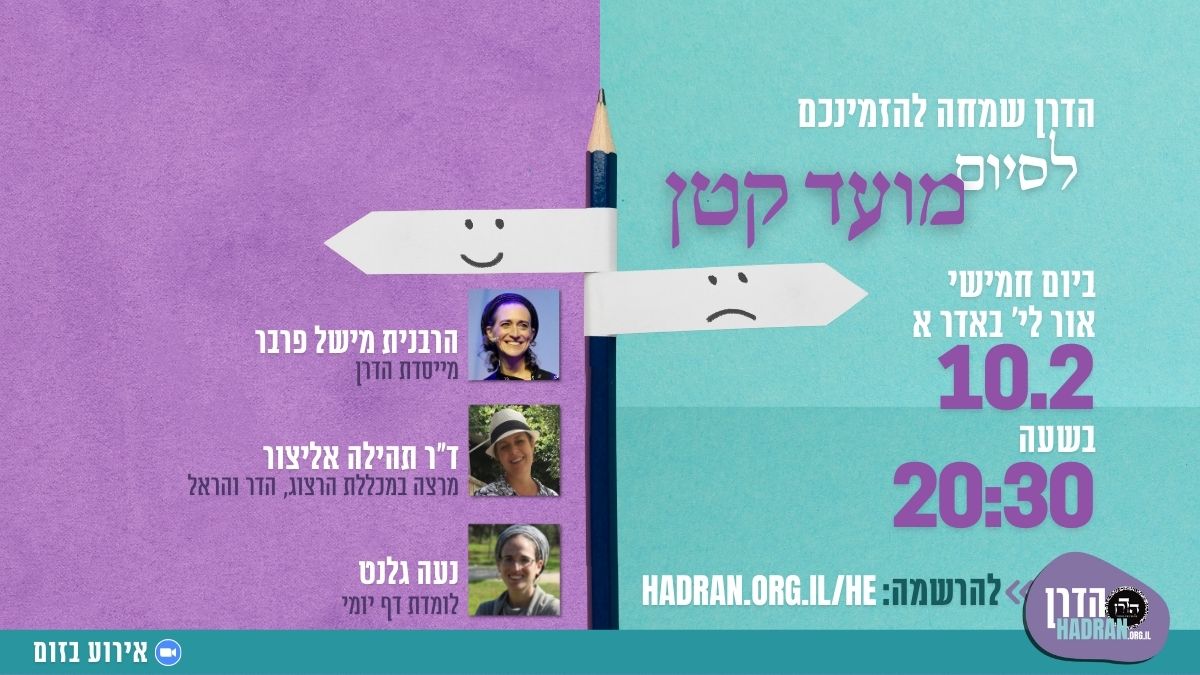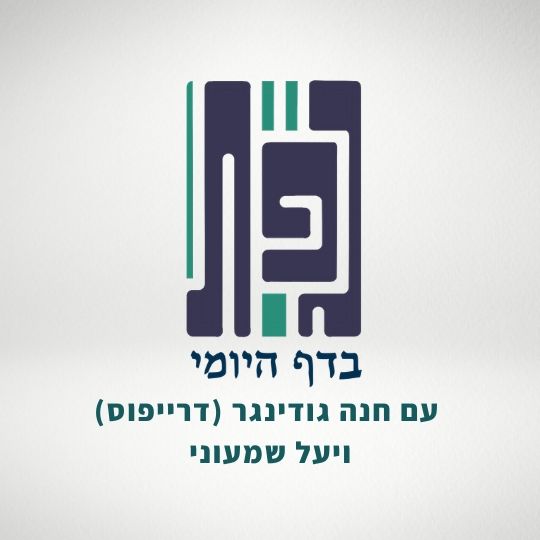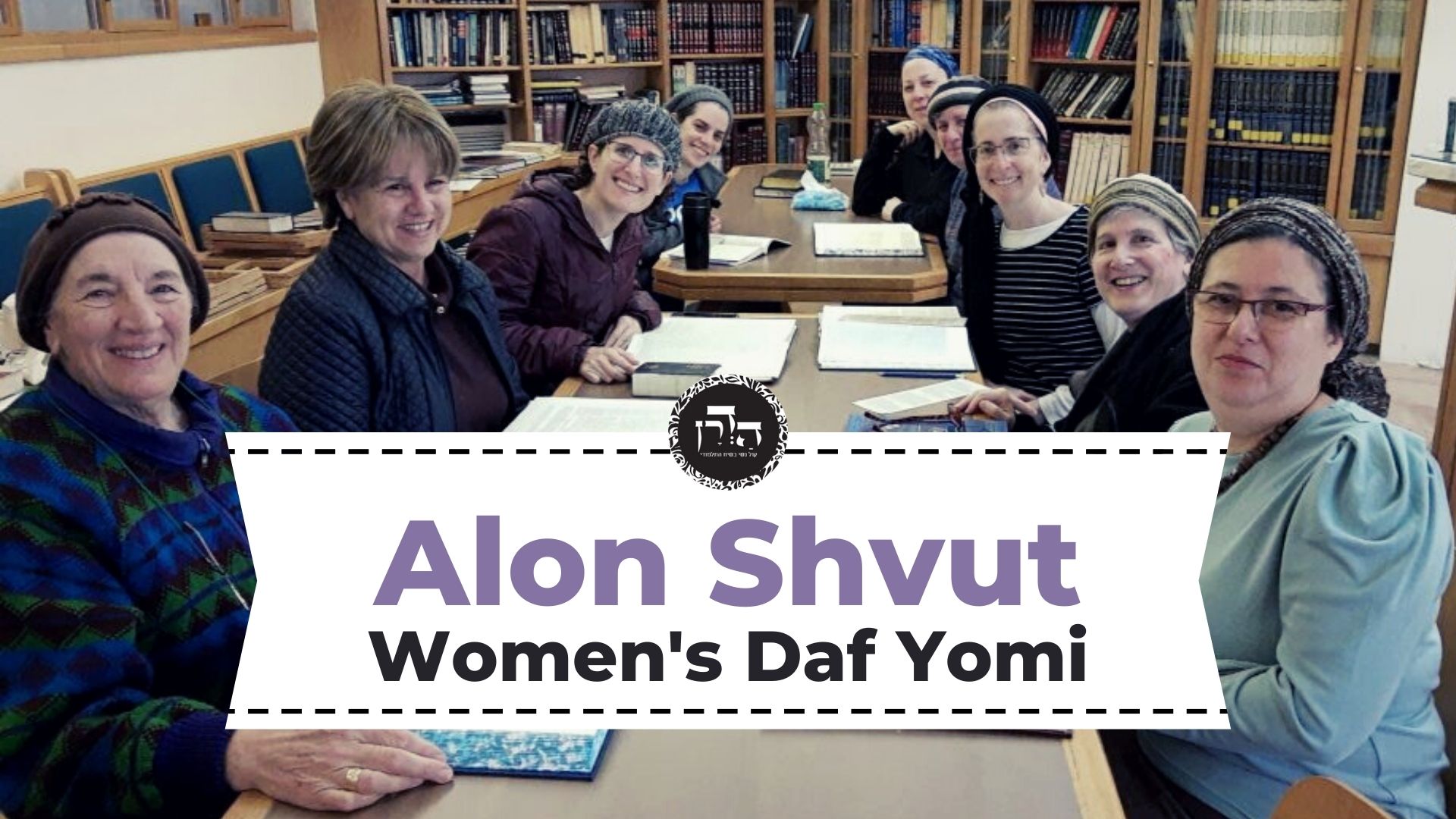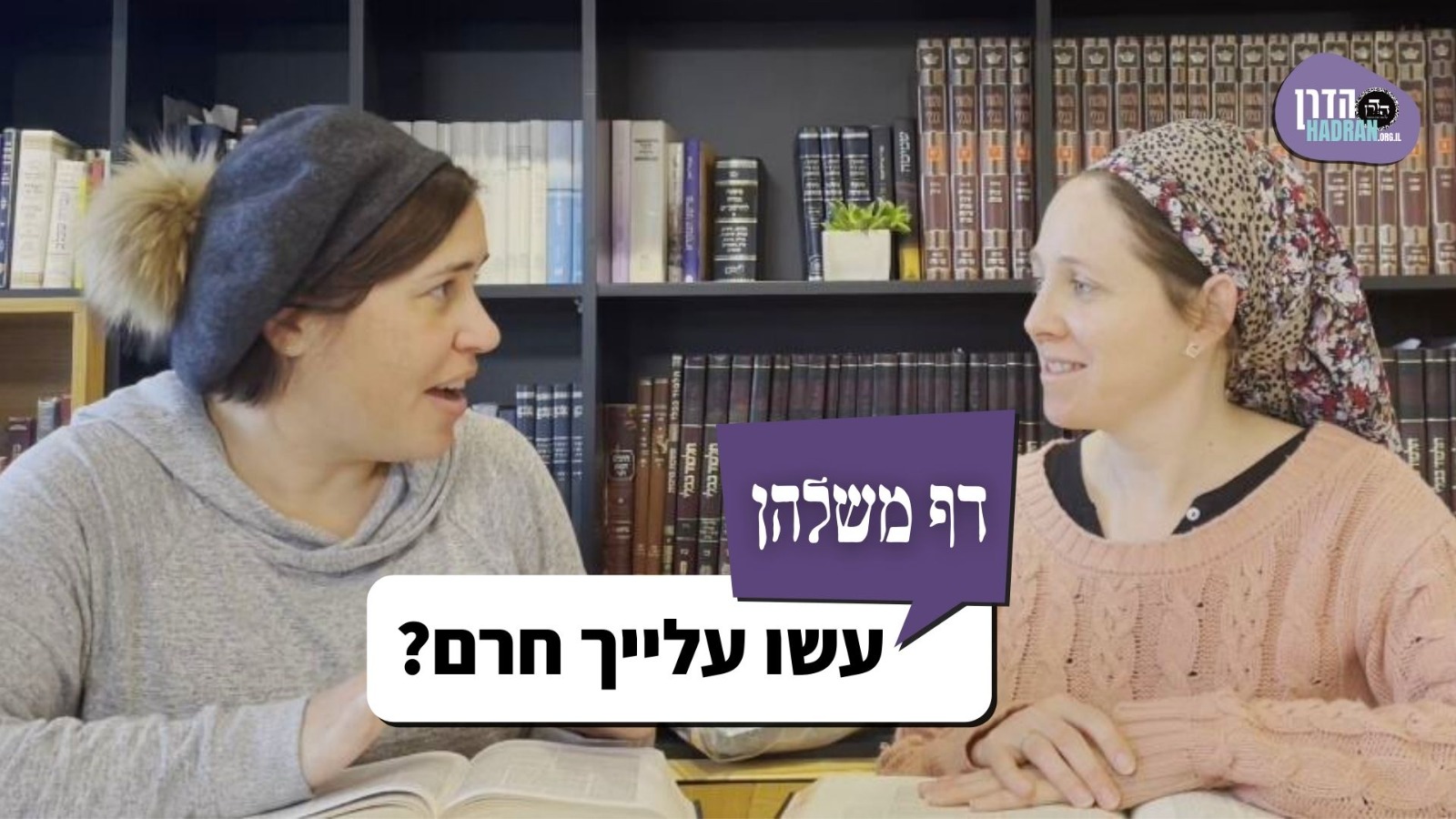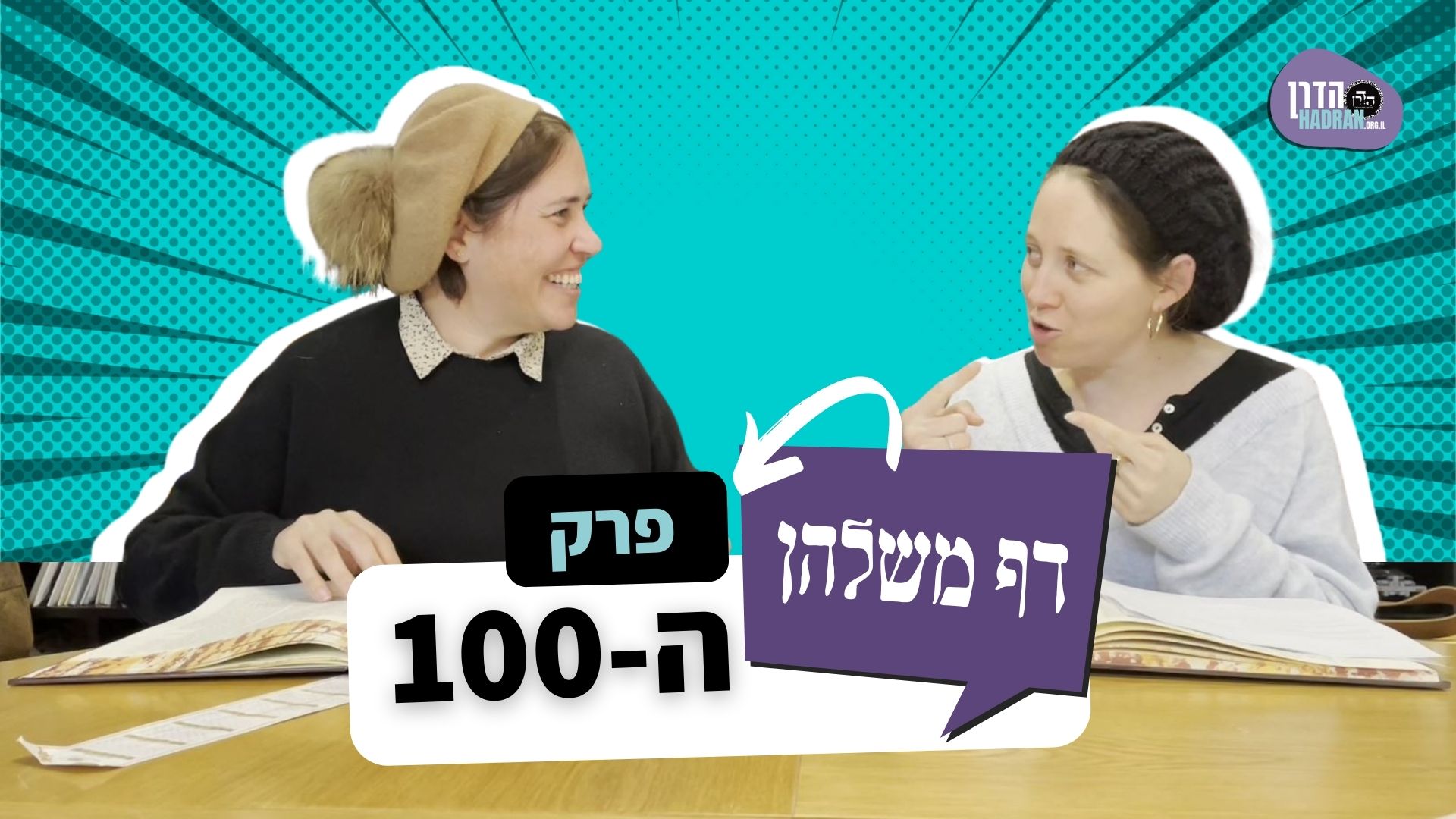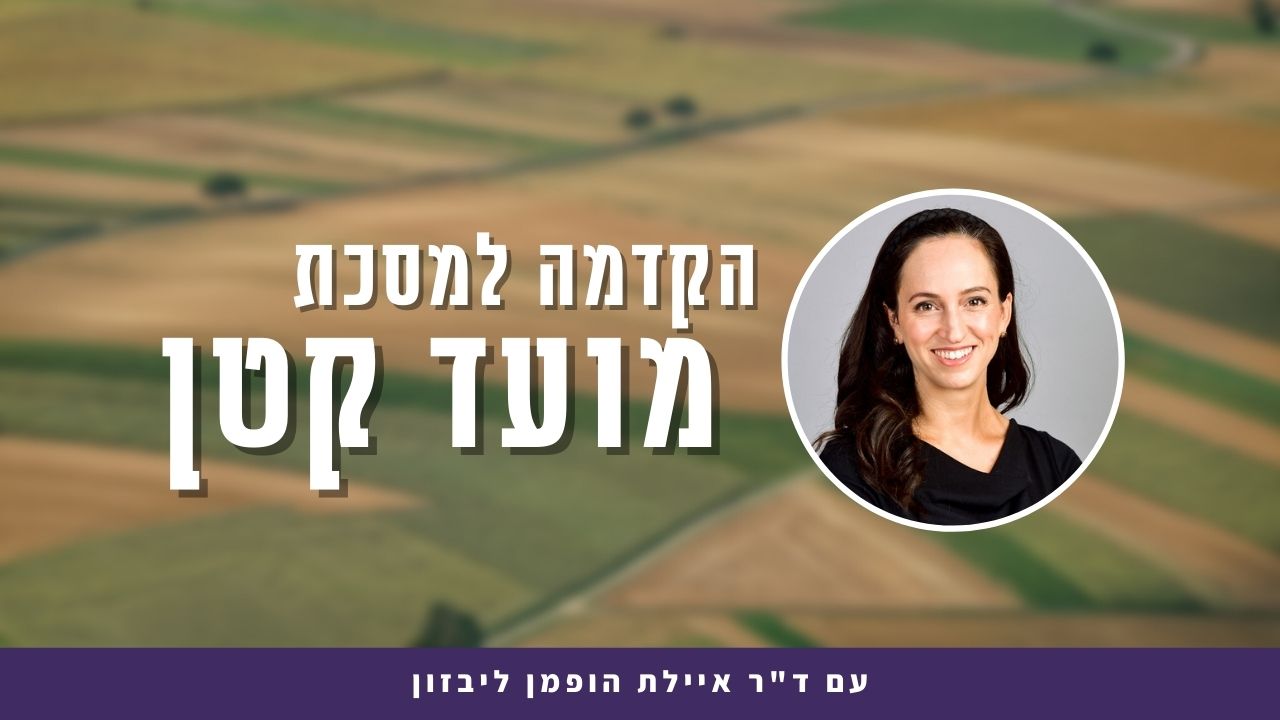מועד קטן יט
וְטוֹוֶה עַל יְרֵיכוֹ תְּכֵלֶת לְצִיצִיתוֹ.
And one may spin sky-blue wool for his ritual fringes on his thigh, but not in the ordinary manner with a spindle, as this procedure must be performed in an altered manner on the intermediate days of a Festival.
גְּמָ׳ תָּנוּ רַבָּנַן: כּוֹתֵב אָדָם תְּפִילִּין וּמְזוּזוֹת לְעַצְמוֹ, וְטוֹוֶה עַל יְרֵיכוֹ תְּכֵלֶת לְצִיצִיתוֹ, וְלַאֲחֵרִים בְּטוֹבָה, דִּבְרֵי רַבִּי מֵאִיר. רַבִּי יְהוּדָה אוֹמֵר: מַעֲרִים, וּמוֹכֵר אֶת שֶׁלּוֹ, וְחוֹזֵר וְכוֹתֵב לְעַצְמוֹ. רַבִּי יוֹסֵי אוֹמֵר: כּוֹתֵב וּמוֹכֵר כְּדַרְכּוֹ כְּדֵי פַרְנָסָתוֹ.
GEMARA: The Sages taught the following baraita: A person may write phylacteries and mezuzot for himself and spin sky-blue wool for his fringes on his thigh. And for others he may do these things as a favor, but not for payment. This is the statement of Rabbi Meir. Rabbi Yehuda says: If he initially made them for himself, he may employ artifice, sell his own and then go back and write new ones for himself. Rabbi Yosei says: He may write and sell them in his usual manner, in the amount that is enough to provide for his livelihood.
אוֹרִי לֵיהּ רַב לְרַב חֲנַנְאֵל, וְאָמְרִי לַהּ רַבָּה בַּר בַּר חָנָה לְרַב חֲנַנְאֵל: הֲלָכָה, כּוֹתֵב וּמוֹכֵר כְּדַרְכּוֹ כְּדֵי פַרְנָסָתוֹ.
Rav ruled for Rav Ḥananel, and some say it was Rabba bar bar Ḥana who ruled for Rav Ḥananel: The halakha is that one may write and sell them in his usual manner, in the amount that is enough to provide for his livelihood.
וְטוֹוֶה עַל יְרֵיכוֹ תְּכֵלֶת. תָּנוּ רַבָּנַן: טוֹוֶה אָדָם עַל יְרֵיכוֹ תְּכֵלֶת לְצִיצִיתוֹ, אֲבָל לֹא בְּאֶבֶן, דִּבְרֵי רַבִּי אֱלִיעֶזֶר. וַחֲכָמִים אוֹמְרִים: אַף בְּאֶבֶן. רַבִּי יְהוּדָה אוֹמֵר מִשְּׁמוֹ: בְּאֶבֶן אֲבָל לֹא בְּפֶלֶךְ, וַחֲכָמִים אוֹמְרִים: בֵּין בְּאֶבֶן בֵּין בְּפֶלֶךְ.
§ The mishna taught: And one may spin sky-blue wool for his ritual fringes on his thigh. The Sages taught a baraita: A person may spin sky-blue wool for his ritual fringes on his thigh, but not with a stone, which can be used to form a small spindle and ease the spinning process; this is the statement of Rabbi Eliezer. But the Rabbis say: One may spin the sky-blue wool even with a stone. Rabbi Yehuda said in the name of Rabbi Eliezer: It is permitted with a stone, but not with a spindle. And the Rabbis say: One may spin this wool with either a stone or a spindle.
אָמַר רַב יְהוּדָה אָמַר שְׁמוּאֵל, וְכֵן אָמַר רַבִּי חִיָּיא בַּר אַבָּא אָמַר רַבִּי יוֹחָנָן: הֲלָכָה בֵּין בְּאֶבֶן בֵּין בְּפֶלֶךְ. וַהֲלָכָה: כּוֹתֵב כְּדַרְכּוֹ וּמוֹכֵר כְּדֵי פַרְנָסָתוֹ.
Rav Yehuda said that Shmuel said, and similarly Rabbi Ḥiyya bar Abba said that Rabbi Yoḥanan said: The halakha is that one may spin the sky-blue wool for fringes on the intermediate days of a Festival, both with a stone and with a spindle, owing to the importance of the mitzva of ritual fringes. And similarly the halakha is: One may write phylacteries and mezuzot on the intermediate days of a Festival in his usual manner and sell enough to provide for his livelihood.
מַתְנִי׳ הַקּוֹבֵר אֶת מֵתוֹ שְׁלֹשָׁה יָמִים קוֹדֶם לָרֶגֶל — בָּטְלָה הֵימֶנּוּ גְּזֵרַת שִׁבְעָה. שְׁמוֹנָה — בָּטְלוּ הֵימֶנּוּ גְּזֵרַת שְׁלֹשִׁים.
MISHNA: One who buries his deceased relative three days before a pilgrimage Festival has the decree of the seven-day period of mourning, i.e., the halakhot and prohibitions associated with that period, nullified for him by the Festival. He is not required to complete this seven-day mourning period after the Festival. If one buries his deceased relative eight days before a pilgrimage Festival, then the decree of thirty days is nullified for him. The restrictions that ordinarily apply during this thirty-day mourning period no longer apply after the Festival.
מִפְּנֵי שֶׁאָמְרוּ: שַׁבָּת עוֹלָה, וְאֵינָהּ מַפְסֶקֶת. רְגָלִים מַפְסִיקִין, וְאֵינָן עוֹלִין.
This is because the Sages said a principle with regard to this issue: Shabbat counts as one of the days of mourning, although one may not mourn on it and it does not interrupt the mourning period, which continues after Shabbat. The pilgrimage Festivals, on the other hand, interrupt the mourning period, so that if one began mourning before such a Festival, then the mourning period is canceled by the Festival. They do not, however, count. If one did not begin mourning before the Festival, or if his relative died during the Festival, then he is required to complete his mourning period afterward, as the days of the Festival do not count toward the requisite days of mourning.
רַבִּי אֱלִיעֶזֶר אוֹמֵר: מִשֶּׁחָרַב בֵּית הַמִּקְדָּשׁ, עֲצֶרֶת כַּשַּׁבָּת.
Rabbi Eliezer says: From the time that the Temple was destroyed, Shavuot is like Shabbat, because nowadays the days following Shavuot are not treated like Festival days. When the Temple stood, many of the Festival’s offerings that could not be sacrificed on Shavuot itself would be sacrificed during the six days following the Festival. Nowadays, however, when offerings are no longer sacrificed, Shavuot lasts for only one day in Eretz Yisrael, and therefore it is treated like Shabbat with regard to mourning: It counts as one of the days of mourning, but does not interrupt the period of mourning.
רַבָּן גַּמְלִיאֵל אוֹמֵר: רֹאשׁ הַשָּׁנָה וְיוֹם הַכִּפּוּרִים כָּרְגָלִים. וַחֲכָמִים אוֹמְרִים: לֹא כְּדִבְרֵי זֶה וְלֹא כְּדִבְרֵי זֶה, אֶלָּא: עֲצֶרֶת כָּרְגָלִים, רֹאשׁ הַשָּׁנָה וְיוֹם הַכִּפּוּרִים כַּשַּׁבָּת.
Rabban Gamliel says: Even Rosh HaShana and Yom Kippur are considered like the pilgrimage Festivals, in that they interrupt the mourning period but are not counted toward the days of mourning. And the Rabbis say: The halakha is neither in accordance with the statement of Rabbi Eliezer nor in accordance with the statement of Rabban Gamliel. Rather, with regard to mourning, Shavuot is treated like the other pilgrimage Festivals, whereas Rosh HaShana and Yom Kippur are treated like Shabbat.
גְּמָ׳ אָמַר רַב: גְּזֵרוֹת — בָּטְלוּ, יָמִים — לֹא בָּטְלוּ, וְכֵן אָמַר רַבִּי הוּנָא: גְּזֵרוֹת — בָּטְלוּ, יָמִים — לֹא בָּטְלוּ. וְרַב שֵׁשֶׁת אָמַר: אֲפִילּוּ יָמִים נָמֵי בָּטְלוּ.
GEMARA: With regard to the mishna’s statement that the seven- and thirty-day periods of mourning are nullified, Rav said: The decree, meaning the main prohibitions of the period, was nullified, but the days of mourning themselves were not entirely nullified. Instead, these periods of mourning remain to some degree. And so said Rav Huna: The decree was nullified, but the days of mourning themselves were not nullified. And Rav Sheshet said: Even the days of mourning were also nullified.
מַאי טַעְמָא יָמִים לֹא בָּטְלוּ? שֶׁאִם לֹא גִּילַּח עֶרֶב הָרֶגֶל — אָסוּר לְגַלֵּחַ אַחַר הָרֶגֶל.
The Gemara asks: What is the reason that the days themselves were not nullified? The Gemara explains: It is so that if one observed eight days of mourning before the Festival, so that the prohibition against hair cutting was nullified before the Festival, but for whatever reason he did not cut his hair on the eve of the Festival, he is prohibited from cutting his hair after the Festival until the end of the thirty-day period of mourning. In other words, the mourning period was not entirely nullified, and since he did not take advantage of the allowance to cut his hair before the Festival, he must observe the prohibitions applying during the thirty-day period of mourning after the Festival as well.
וְהָתַנְיָא: הַקּוֹבֵר אֶת מֵתוֹ שְׁלֹשָׁה יָמִים קוֹדֶם לָרֶגֶל — בָּטְלָה הֵימֶנּוּ גְּזֵרַת שִׁבְעָה, שְׁמוֹנָה יָמִים קוֹדֶם לָרֶגֶל — בָּטְלָה הֵימֶנּוּ גְּזֵרַת שְׁלֹשִׁים, וּמְגַלֵּחַ עֶרֶב הָרֶגֶל. אִם לֹא גִּילַּח עֶרֶב הָרֶגֶל — אָסוּר לְגַלֵּחַ אַחַר הָרֶגֶל.
But isn’t it taught in a baraita: In the case of one who buries his dead relative three days before a pilgrimage Festival, the decree of the seven-day period of mourning is nullified for him. If one buries his dead relative eight days before a Festival, the decree of thirty days is nullified for him, and therefore he may cut his hair on the eve of the Festival. If, however, he did not cut his hair on the eve of the Festival, he is prohibited from cutting his hair after the Festival until the end of the thirty-day period of mourning.
אַבָּא שָׁאוּל אוֹמֵר: מוּתָּר לְגַלֵּחַ אַחַר הָרֶגֶל, שֶׁכְּשֵׁם שֶׁמִּצְוַת שְׁלֹשָׁה מְבַטֶּלֶת גְּזֵרַת שִׁבְעָה, כָּךְ מִצְוַת שִׁבְעָה מְבַטֶּלֶת גְּזֵרַת שְׁלֹשִׁים.
Abba Shaul says: Even if he failed to cut his hair on the eve of the Festival, he is permitted to cut his hair after the Festival, for just as his observance of the mitzva of three days of mourning prior to the Festival cancels the decree of the seven-day period of mourning, and so if the deceased was buried three days before the Festival, the mourner is no longer required to continue this period of mourning after the Festival, so too, his observance of the mitzva of seven days of mourning before the Festival cancels the decree of the thirty-day period of mourning.
שִׁבְעָה? וְהָאֲנַן שְׁמוֹנָה תְּנַן! קָסָבַר אַבָּא שָׁאוּל: מִקְצָת הַיּוֹם כְּכוּלּוֹ, וְיוֹם שְׁבִיעִי עוֹלֶה לוֹ לְכָאן וּלְכָאן. אָמַר רַב חִסְדָּא אָמַר רָבִינָא בַּר שֵׁילָא: הֲלָכָה כְּאַבָּא שָׁאוּל.
The Gemara asks: Why does Abba Shaul speak of the observance of seven days of mourning? But didn’t we learn in the mishna that it requires eight days? The Gemara explains: Abba Shaul maintains that the legal status of part of the day is like that of an entire day, and therefore the seventh day counts as both the final day of the seven-day period of mourning and the first day of the thirty-day period of mourning. Rav Ḥisda said that Ravina bar Sheila said: The halakha is in accordance with the opinion of Abba Shaul.
וּמוֹדִים חֲכָמִים לְאַבָּא שָׁאוּל כְּשֶׁחָל שְׁמִינִי שֶׁלּוֹ לִהְיוֹת בְּשַׁבָּת עֶרֶב הָרֶגֶל, שֶׁמּוּתָּר לְגַלֵּחַ בְּעֶרֶב שַׁבָּת.
And furthermore, even the Rabbis concede to Abba Shaul that when one’s eighth day of mourning occurs on a Shabbat, which is also the eve of a Festival, he is permitted to cut his hair on Friday, which is the seventh day. Since he is unavoidably prevented from cutting his hair on the eighth day, as it is prohibited for him to cut his hair on Shabbat, he may do so already on Friday, although it is only his seventh day of mourning.
כְּמַאן אָזְלָא הָא דְּאָמַר רַב עַמְרָם אָמַר רַב: אָבֵל, כֵּיוָן שֶׁעָמְדוּ מְנַחֲמִין מֵאֶצְלוֹ, מוּתָּר בִּרְחִיצָה? כְּמַאן — כְּאַבָּא שָׁאוּל.
The Gemara asks: In accordance with whose opinion is that which Rav Amram said that Rav said: With regard to a mourner, once the comforters have stood up to leave his house on the seventh day of his mourning, he is immediately permitted to bathe? In accordance with whose opinion? In accordance with the opinion of Abba Shaul. He maintains that a part of the seventh day is treated as an entire day with regard to this issue.
אָמַר אַבָּיֵי: הֲלָכָה כְּאַבָּא שָׁאוּל בְּיוֹם שִׁבְעָה, וּמוֹדִים חֲכָמִים לְאַבָּא שָׁאוּל בְּיוֹם שְׁלֹשִׁים, דְּאָמְרִינַן מִקְצָת הַיּוֹם כְּכוּלּוֹ.
Abaye said: The halakha is in accordance with the opinion of Abba Shaul with regard to the seventh day of mourning, and the Rabbis concede to Abba Shaul with regard to the thirtieth day, for with regard to the thirtieth day we certainly say that the legal status of part of the day is like that of an entire day, and so a mourner may already cut his hair on the morning of the thirtieth day.
רָבָא אָמַר: הֲלָכָה כְּאַבָּא שָׁאוּל בְּיוֹם שְׁלֹשִׁים, וְאֵין הֲלָכָה כְּאַבָּא שָׁאוּל בְּיוֹם שִׁבְעָה. וּנְהַרְדָּעֵי אָמְרִי: הֲלָכָה כְּאַבָּא שָׁאוּל בָּזוֹ וּבָזוֹ, דְּאָמַר שְׁמוּאֵל: הֲלָכָה כְּדִבְרֵי הַמֵּיקֵל בְּאֵבֶל.
Rava said: The halakha is in accordance with the opinion of Abba Shaul with regard to the thirtieth day of mourning, but the halakha is not in accordance with Abba Shaul with regard to the seventh day. And the Sages of Neharde’a say: The halakha is in accordance with the opinion of Abba Shaul with regard to both the seventh day and the thirtieth day, for Shmuel said: The halakha follows the statement of the more lenient authority in matters relating to mourning.
שְׁלֹשִׁים יוֹם מְנָלַן? יָלֵיף ״פֶּרַע״ ״פֶּרַע״ מִנָּזִיר. כְּתִיב הָכָא: ״רָאשֵׁיכֶם אַל תִּפְרָעוּ״, וּכְתִיב הָתָם: ״גַּדֵּל פֶּרַע שְׂעַר רֹאשׁוֹ״, מָה לְהַלָּן שְׁלֹשִׁים, אַף כָּאן שְׁלֹשִׁים.
§ The Gemara asks now about the thirty-day mourning period: From where do we derive the thirty-day period of mourning? The Gemara answers: It is learned by way of a verbal analogy between one instance of the word pera and a different instance of the word pera stated with regard to a nazirite. Here, in the instructions given to Aaron not to mourn the deaths of his sons, it is written: “Let the hair of your heads not grow loose [tifra’u]” (Leviticus 10:6), which indicates that ordinary mourners are required to grow their hair long. And there, with regard to a nazirite, it is written: “He shall let the hair of his head grow long [pera]” (Numbers 6:5). Just as there, in the case of the nazirite, he must grow his hair for thirty days, so too, here a mourner must grow his hair for thirty days.
וְהָתָם מְנָלַן? אָמַר רַב מַתְנָה: סְתַם נְזִירוּת — שְׁלֹשִׁים יוֹם, מַאי טַעְמָא? אָמַר קְרָא: ״קָדוֹשׁ יִהְיֶה״, יִהְיֶה בְּגִימַטְרִיָּא תְּלָתִין הָווּ.
The Gemara asks: And there, with regard to a nazirite, from where do we derive that he must grow his hair for thirty days? Nowhere is this explicitly stated with regard to a nazirite. The Gemara answers: Rav Mattana said: An unspecified naziriteship, when one takes a vow of naziriteship without specifying for how long, extends for thirty days. What is the reason for this? The verse states: “He shall be sacred, and he shall let the hair of his head grow” (Numbers 6:5), and “He shall be [yihye],” which is written yod, heh, yod, heh, has a numerical value [gimatriyya] of thirty, as yod has a numerical value of ten and heh has a numerical value of five. This implies that an unspecified naziriteship extends for thirty days, and by way of the verbal analogy, this is applied to mourning as well.
אָמַר רַב הוּנָא בְּרֵיהּ דְּרַב יְהוֹשֻׁעַ: הַכֹּל מוֹדִין כְּשֶׁחָל שְׁלִישִׁי שֶׁלּוֹ לִהְיוֹת עֶרֶב הָרֶגֶל — שֶׁאָסוּר בִּרְחִיצָה עַד הָעֶרֶב.
Rav Huna, son of Rav Yehoshua, said: Everyone, including Abba Shaul, who says that part of a day is treated like a full day, agrees that when his third day of mourning occurs on the eve of the Festival, the mourner is prohibited from bathing his body until the evening. In this case, the principle that the legal status of part of the day is like that of an entire day does not apply. Rather, one must observe three full days of mourning. He must therefore wait until the evening and wash himself with cold water, or wait until the intermediate days of the Festival and bathe in hot water.
אָמַר רַב נְחֶמְיָה בְּרֵיהּ דְּרַב יְהוֹשֻׁעַ: אַשְׁכַּחְתִּינְהוּ לְרַב פַּפֵּי וּלְרַב פָּפָּא דְּיָתְבִי וְקָאָמְרִי: הֲלָכָה כְּרַב הוּנָא בְּרֵיהּ דְּרַב יְהוֹשֻׁעַ. אִיכָּא דְּאָמְרִי, אָמַר רַב נְחֶמְיָה בְּרֵיהּ דְּרַב יוֹסֵף: אַשְׁכַּחְתִּינְהוּ לְרַב פַּפֵּי וּלְרַב פָּפָּא וּלְרַב הוּנָא בְּרֵיהּ דְּרַב יְהוֹשֻׁעַ דְּיָתְבִי וְקָאָמְרִי: הַכֹּל מוֹדִים שֶׁאִם חָל שְׁלִישִׁי שֶׁלּוֹ לִהְיוֹת עֶרֶב הָרֶגֶל — שֶׁאָסוּר בִּרְחִיצָה עַד הָעֶרֶב.
Rav Neḥemya, son of Rav Yehoshua, said: I once found Rav Pappi and Rav Pappa sitting together and saying: The halakha is in accordance with the opinion of Rav Huna, son of Rav Yehoshua. There are those who say a different version of this tradition: Rav Neḥemya, son of Rav Yosef, said: I once found Rav Pappi, Rav Pappa, and Rav Huna, son of Yehoshua, sitting together and saying: Everyone concedes that when the third day of mourning occurs on the eve of a Festival, the mourner is prohibited from bathing his body until the evening.
בְּעָא מִינֵּיהּ אַבָּיֵי מֵרָבָא: קְבָרוֹ בָּרֶגֶל, רֶגֶל עוֹלֶה לוֹ לְמִנְיַן שְׁלֹשִׁים, אוֹ אֵין רֶגֶל עוֹלֶה לוֹ לְמִנְיַן שְׁלֹשִׁים? לְמִנְיַן שִׁבְעָה לָא קָמִיבַּעְיָא לִי, דְּלָא נָהֲגָא מִצְוַת שִׁבְעָה בָּרֶגֶל. כִּי קָא מִיבַּעְיָא לִי לְמִנְיַן שְׁלֹשִׁים, דְּקָא נָהֲגָא מִצְוַת שְׁלֹשִׁים בָּרֶגֶל, מַאי?
Abaye inquired of Rava: If one buried his dead relative on the Festival itself, does the Festival count toward his thirty-day period of mourning, or does the Festival not count toward his thirty-day period of mourning? Abaye elaborated on his question: I do not ask whether or not the Festival counts toward his seven-day period of mourning because the obligation to observe seven days of mourning does not apply at all during the Festival, and therefore he must certainly observe the seven-day mourning period, beginning from after the Festival. What I am asking is with regard to the thirty-day period of mourning, because certain aspects of the mitzva of the thirty-day mourning period do in fact apply during the Festival, e.g., the prohibitions to launder clothes and cut hair. What, then, is the halakha: Do the days of the Festival count toward the thirty days or not?
אֲמַר לֵיהּ: אֵינוֹ עוֹלֶה. אֵיתִיבֵיהּ: הַקּוֹבֵר אֶת מֵתוֹ שְׁנֵי יָמִים קוֹדֶם הָרֶגֶל — מוֹנֶה חֲמִשָּׁה יָמִים אַחַר הָרֶגֶל, וּמְלַאכְתּוֹ נַעֲשֵׂית עַל יְדֵי אֲחֵרִים, וַעֲבָדָיו וְשִׁפְחוֹתָיו עוֹשִׂים בְּצִינְעָא בְּתוֹךְ בֵּיתוֹ, וְאֵין רַבִּים מִתְעַסְּקִין עִמּוֹ,
Rava said to him: The Festival does not count toward the thirty days. Abaye raised an objection to Rava’s opinion from the following baraita: If one buries his dead relative two days before a Festival, he must count five days of mourning after the Festival, and during this period his work is performed for him by others. And his menservants and maidservants do this work in private inside his house, and the public need not occupy themselves with him by coming to console him,

